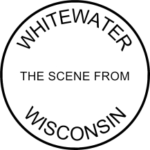Two questions haunt Old Whitewater (where Old Whitewater is a state of mind rather than an age or a particular person):
What does it mean to be a college town? and What is meaningful community development?
(There are other serious questions, but one can be sure – at the least – that these two have Whitewater in their gaze.)
The community has grappled openly with the first question – without resolution – long before I began writing in ’07. The second question, made more germane with each passing year, is likely to surpass even the first in local importance.
Neither question will when finally resolved – and both will be resolved – yield happy answers for the last thirty years of policymaking.
Indeed, between now and then, policymaking will look much as much like whistling past the graveyard as anything else.



Those are big questions.
The first is a constant topic because the growth engine is the university. Residents have always seen campus growth as a threat. However, they have no alternative and everyone knows it. Unlike Madison, we are not a research university so growth here has no serious big money component. Startups gravitate to designated research universities not places like our campus. Growth here is the general campus expanding, that’s all.
The state is about short term results that have fueled the drive for business offerings. With Rock, expect even more emphasis on short term results. (There is our “community engagement.”) It’s all “get a job and get out quick”. The rest of the city does not have a different growth mechanism so the imbalance brings grousing but no solutions.
The first and second questions need not be related. Whitewater could have a thriving campus and a thriving private sector; as it is, she has a weak private sector. It’s true that UW-Whitewater is not a research campus, but one might have had private industries that energized and uplifted the community even if not research-oriented.
That simply hasn’t happened here: a few landlords, a few bankers, and their willing enablers in government do not a prosperous community make. (No matter how they market themselves, the only household or individual incomes they’ve developed are mostly their own.) Whitewater’s not a thriving free market of prosperous individuals – it’s a highly regulated economy with a restrictive cultural perimeter fence.
The second question (where the only sound answer is that community development requires meaningful gains in individual and household income) will come to define our time, most of its leading figures (with a few exceptions), and the legacy of the last generation’s policymakers.